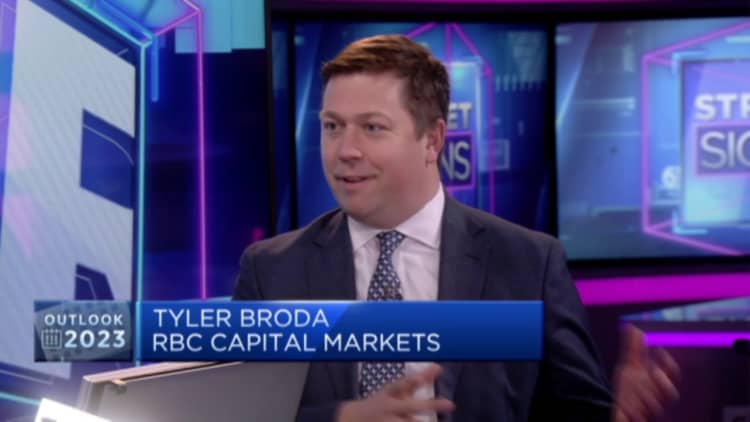
Sheets of copper cathode are pictured at BHP Billiton’s Escondida, the world’s biggest copper mine, in Antofagasta, northern Chile March 31, 2008.
Ivan Alvarado | Reuters
Copper — traditionally seen as a leading indicator of economic health — has unsurprisingly had a rough year. But analysts expect a resurgence in 2023, even as the global outlook remains highly uncertain.
Some of Wall Street’s biggest banks in recent weeks have suggested a combination of short-term supply tightness and long-term energy transition-related demand will push the red metal north from here.
The downward pressure in 2022 stemmed in part from persistent market expectations for a surplus inflection in the metal market, driven by anticipation of sluggish demand amid slowing global growth and an acceleration of mining activity, Goldman Sachs strategists said in a note last week.
However, this has not come to fruition, and Goldman highlighted that the cathode market has remained in a “clear deficit (GS estimate 210kt versus 131kt previously), with global visible stocks falling to their lowest level in 14 years,” metals strategist Nick Snowdown said.
“Equally important, the surplus we previously expected for 2023 (169kt surplus) has also now disappeared in our latest balance iteration (GSe 178kt deficit),” he added.
The metal — used in many sectors — has also endured a tough 2022 due to tighter U.S. monetary policy, the energy crisis arising from Russia’s war in Ukraine and China’s combination of strict Covid-19 lockdowns and a weak property market. LME copper prices peaked at over $10,600/t in March this year.
Should China’s relaxation of its zero-Covid restrictions advance further toward a reopening of the economy, restocking is likely to play out, Goldman believes.

“If China were to return its copper stock to consumption ratio to pre-2020 levels, that would imply as much as a 500kt boost to physical demand,” Snowdown said.
Three-month copper futures on the London Metal Exchange traded at $8,543 on Monday morning in Europe, after posting their strongest month since April 2021 in November on hopes for a demand boost if China eased its zero-Covid policies.
Goldman last week hiked its 12-month forecast to $11,000/t from $9,000/t and upgraded its average price forecast to $9,750/t for 2023 and $12,000/t in 2024.
Bank of America commodity strategists believe copper could rally to $12,000/t in the second quarter of 2023, given the right set of circumstances. Such a scenario would require a pivot by the U.S. Federal Reserve toward less aggressive monetary policy tightening, limiting upside in the U.S. dollar, and for demand to remain supported as the planned energy transition accelerates.
“Notwithstanding the macro headwinds, physical markets have remained tight, highlighting the lack of spare copper units available at present,” Commodity Strategist Michael Widmer said in Bank of America’s 2023 metals outlook report.
Widmer also noted that global copper demand has proven resilient, rising on an annual basis year-to-date as purchases outside China run at record levels.
While macroeconomic headwinds will likely persist into 2023, Widmer said offtake should remain positive when modeled on global GDP growth.

“Taking this a step further … China’s grid spending has offset weakness in the wider economy: indeed, building out the electricity infrastructure has completely offset weakness in the housing market,” Widmer said, adding that the key question going forward was whether this is a one-off or the beginnings of a structural trend.
He also noted that the correlation between global copper demand and industrial production growth has broken down over the past year and a half.
“In our view, this confirms to some extent that green spending has already supported global copper demand and physical markets,” Widmer said.
Bank of America’s collated data on demand growth rates from sectors linked to net-zero policies indicated an expansion in copper consumption of 4.5% year-on-year out to 2030. By contrast, potential demand growth has been 2.1% over the past two decades, Widmer noted.
Consensus more cautious
Although taking a more cautious view to reflect softer market sentiment as a result of the expected global economic downturn, strategists at Fitch Ratings last week suggested any hit to copper will be offset by “supportive short- and medium-term supply-demand drivers.”
“We expect a moderate increase in global primary copper consumption of about 2% in 2023, similar to 2022. Mine supply will grow by around 4% in 2023, although disruptions may affect that,” they said in a research note.
“A tightly balanced market and minimal global copper stocks (less than two weeks’ consumption) will sustain prices in 2023. Copper’s longer-term prospects are supported by demand from the energy transition.”

Fitch maintained a spot copper price assumption of $8,000/t for 2023, sliding to $7,500/t in 2024 and 2025.
However, other institutions retain a more bearish view, at least in the short term. BNP Paribas in its 2023 outlook forecast a three-month copper price of $6,800/t in the first quarter of next year, falling to $6,465/t in the second, but recovering to $8,250/t by the end of 2024.
“We expect a fall in European manufacturing activity to add to the impact of slowing Chinese and U.S. activity,” the French lender said.
“Rising mine supply and accelerating output of Chinese refined copper are expected to push the market into a sizeable surplus in 2023, easing LME spread tightness and weighing on prices.”







